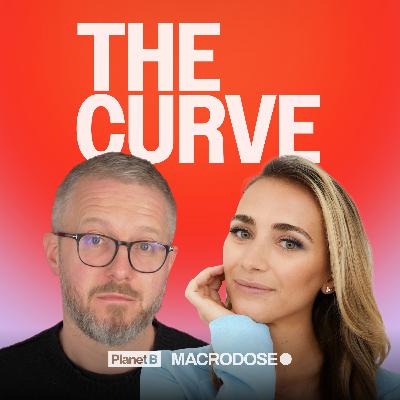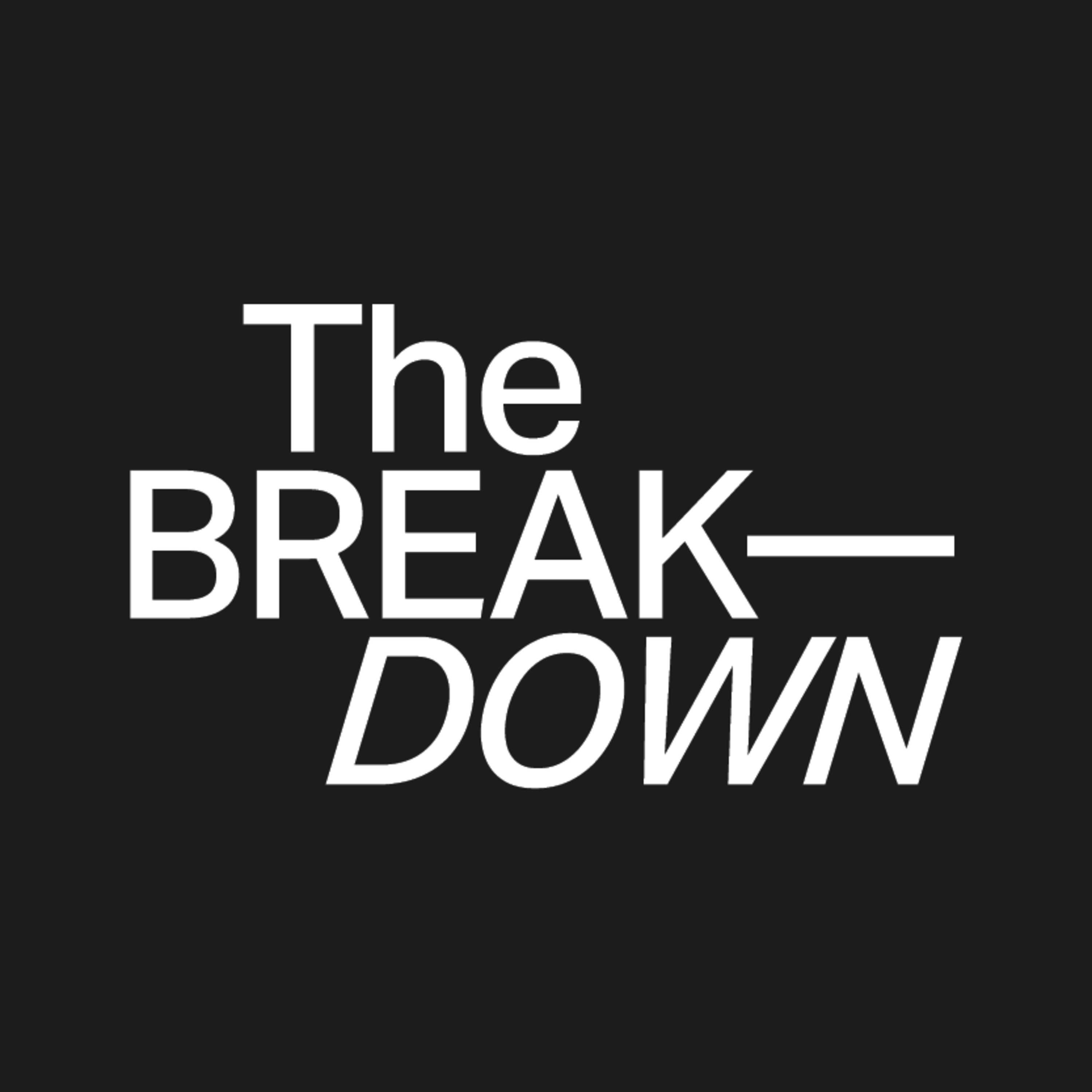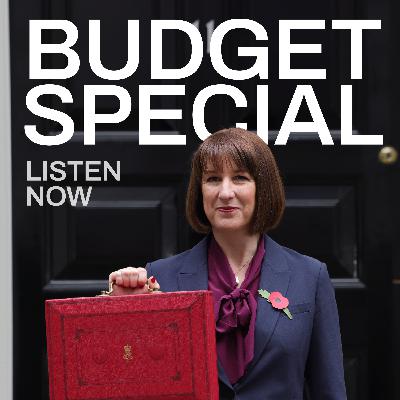Discover Macrodose
Macrodose

237 Episodes
Reverse
On this week's MACRODOSE, James Meadway unpacks: the wildfires in California and their potentially catastrophic economic fallout (1:20), a New York Times piece on the politics of climate change and whether it’s time for a new “green populism” (11:54), and the financial mess Keir Starmer’s government is already finding itself in (17:00).Biden Left us Behind with a "Prius Economy": https://www.nytimes.com/2025/01/07/opinion/electric-vehicles-tax-credits.htmlSubscribe to support the show at patreon.com/Macrodose. Your pledge is a donation supporting free public education; perks are thank-you gifts for your support.Got a question or comment? Reach out to us at macrodose@planetbproductions.co.uk.To learn more about the work we do at Planet B Productions, head to planetbproductions.co.uk.
In the first episode of The Curve, James Meadway and Grace Blakeley dive deeper into the economic stories hitting the headlines and what they mean for all of us. First up is US President Donald Trump announcing a slew of tariffs that have provoked reaction globally.The extended version of this show is available to Macrodose Patreon members. Subscribe to support the show at patreon.com/Macrodose. Your pledge is a donation supporting free public education; perks are thank-you gifts for your support.
On this week's MACRODOSE, James Meadway discusses the battle to develop climate-resilient potatoes (0:50), a new proposal on revamping Britain’s council farms (7:33) and a brief note on Trump’s new appointments, what can we expect from MAGA 2.0? (11:23).
Abundance Report: https://www.in-abundance.org/latest/new-report-food-systems-in-common
For more content, including The Fix - Macrodose's monthly newsletter - and to support the show, visit: https://www.patreon.com/macrodose
Got a question or comment? Reach us at macrodose@planetbproductions.co.uk
For more about the work we do at Planet B Productions, go to planetbproductions.co.uk
In the latest episode of The Break–Down, host Adrienne Buller is joined by renowned economist Ann Pettifor to discuss her new book, The Global Casino: How Wall Street Gambles with People and Planet.We’ve all heard the refrain. Whenever a politician proposes a policy that might genuinely improve people’s lives — free and fast buses, affordable housing, large-scale renewable energy — the response is immediate: we can’t afford it. Media pundits and technocrats fixate on national debt, balanced budgets and the need not to “spook” the ever-mysterious bond vigilantes.This obsession doesn’t just dominate public debate — it paralyses action on the very challenges we urgently need to confront, from transforming our energy system to properly funding care for the most vulnerable.As this episode makes clear, it’s also profoundly misleading.The Global Casino traces the extraordinary power of Wall Street, revisits Keynes’s legacy, and asks a fundamental question: what is money, really? For Ann Pettifor, money is an extraordinary human invention — one that could be used to reshape our world for the better, rather than to enrich a powerful few.In today’s episode, she explains how — and why it matters now more than ever.
On this week's Macrodose, James Meadway looks at Canadian Prime Minister Mark Carney’s blockbuster speech at the World Economic Forum (0:57), the UK government’s long-delayed report on global biodiversity loss, ecosystem collapse, and national security (7:43), and how China’s expansion in the Arctic may well be threatening Russia’s sphere of influence, more than that of the United States (14:47).Subscribe to support the show at patreon.com/Macrodose. Your pledge is a donation supporting free public education; perks are thank-you gifts for your support.Got a question or comment? Reach out to us at macrodose@planetbproductions.co.uk.To learn more about the work we do at Planet B Productions, head to planetbproductions.co.uk.Planet B, the production company that brings you Macrodose, is hiring a new Head of Production: https://planet-b-productions.homerun.co/head-of-production/en
On this week's Macrodose, James Meadway looks at the worsening trade and tariff war over Trump’s plans for Greenland (1:24), some positive climate news from India and China, where coal-fired power generation has fallen for the first time in decades (13:13), and an interesting new report on AI productivity (15:23).Subscribe to support the show at patreon.com/Macrodose. Your pledge is a donation supporting free public education; perks are thank-you gifts for your support.Got a question or comment? Reach out to us at macrodose@planetbproductions.co.uk.To learn more about the work we do at Planet B Productions, head to planetbproductions.co.uk.Planet B, the production company that brings you Macrodose, is hiring a new Head of Production: https://planet-b-productions.homerun.co/head-of-production/en
On this week's Macrodose, James Meadway looks at the climate change context behind the current protests in Iran (1:05), and Donald Trump’s bustup with federal reserve chair Jerome Powell (10:12).Subscribe to support the show at patreon.com/Macrodose. Your pledge is a donation supporting free public education; perks are thank-you gifts for your support.Got a question or comment? Reach out to us at macrodose@planetbproductions.co.uk.To learn more about the work we do at Planet B Productions, head to planetbproductions.co.uk.Planet B, the production company that brings you Macrodose, is hiring a new Head of Production: https://planet-b-productions.homerun.co/head-of-production/en
For the first Macrodose episode of 2026, James Meadway takes a look at US President Donald Trump's operation in Venezuela and the seizure of the nation's leader Nicolas Maduro (1:26). Plus Trump's posturing about his desires to annex Greenland (7:39).Subscribe to support the show at patreon.com/Macrodose. Your pledge is a donation supporting free public education; perks are thank-you gifts for your support.Got a question or comment? Reach out to us at macrodose@planetbproductions.co.uk.To learn more about the work we do at Planet B Productions, head to planetbproductions.co.uk.
On this week's macrodose - a special lookback at the tumultuous year that was 2025, and the various twists and turns for our global economy.James Meadway is joined by Faiza Shaheen — author, economist and Executive Director of Tax Justice UK — and Kojo Koram, author, Professor at Loughborough University, and host of Death in Westminster, a forthcoming narrative series about inequality in the UK, produced by Planet B Productions.Subscribe to support the show at patreon.com/Macrodose. Your pledge is a donation supporting free public education; perks are thank-you gifts for your support.Got a question or comment? Reach out to us at macrodose@planetbproductions.co.uk.To learn more about the work we do at Planet B Productions, head to planetbproductions.co.uk.
On this week's episode of Macrodose, James Meadway takes a look at how the drive to produce and consume more is creating a monumental trail of waste (0:33), and what the impacts of surpassing ‘peak’ demand in oil will be (5:09).Subscribe to support the show at patreon.com/Macrodose. Your pledge is a donation supporting free public education; perks are thank-you gifts for your support.Got a question or comment? Reach out to us at macrodose@planetbproductions.co.uk.To learn more about the work we do at Planet B Productions, head to planetbproductions.co.uk.
The Break—Down returns! This week Adrienne returns for a fascinating conversation with Brazilian sociologist, political economist, author, and activist, Sabrina Fernandes. When Luiz Inácio Lula da Silva, or Lula, was re-elected as the President of Brazil in 2022, defeating Jair Bolsonaro in a tense election, the Brazilian left and many around the world breathed an almost literal sigh of relief. Under Bolsonaro, Brazil’s ecological and climate record was scorched, with deforestation in the Amazon reaching record highs.Hopes were high, and for good reason: Lula campaigned on the rights of the working class and Brazil’s Indigenous peoples; under his watch deforestation quickly began to fall; and at COP27 in Egypt he declared in no uncertain terms: "Brazil is back." Yet Lula’s record so far is complex, particularly when it comes to the challenges and perceived trade-offs of economic development and the climate, all while managing powerful competing forces in Brazilian politics. As COP30 begins in Belém Brazil, Adrienne is joined by Sabrina Fernandes, an economic sociologist and head of research at the Alameda Institute, to discuss her essay “Lula’s Dilemma”, which she wrote for the second print issue of the BREAK—DOWN, on the complexities of Brazilian ecological politics, the power of big agri-business and what we can expect from Brazil’s leadership of this year’s climate conference. Further reading: Sabrina Fernandes, Lula’s Dilemma, The BREAK—DOWNSubscribe to the BREAK—DOWN for just £15/year.
In a special Budget crossover episode, James Meadway is joined by Carys Afoko, Host of Over the Top and Under the Radar, and Hannah Peaker, deputy chief executive at the New Economics Foundation, and occasional host of their New Economics Podcast.Together, they give their reaction to Rachel Reeves' budget that could seal her and Keir Starmer's future.Subscribe to support the show at patreon.com/Macrodose. Your pledge is a donation supporting free public education; perks are thank-you gifts for your support.Got a question or comment? Reach out to us at macrodose@planetbproductions.co.uk.To learn more about the work we do at Planet B Productions, head to planetbproductions.co.uk.
This week on The Curve, James Meadway is joined by Antonia Jennings - chief executive at the centre for London.Together they discuss Rachel Reeves' upcoming budget blunders (1:36). In the full version of the show available exclusively to Patreon supporters, James and Antonia also discuss the series of changes to Britain's asylum system announced this week by home secretary Shabana Mahmood (28:24), and how energy companies have recorded record profits in the UK (42.38)Subscribe to support the show at patreon.com/Macrodose. Your pledge is a donation supporting free public education; perks are thank-you gifts for your support.
On this week's episode of Macrodose, James Meadway takes a look at the context surrounding the world's climate negotiations as delegates gather in Brazil for COP30 (1:26), and how the world is looking to adapt to a hotter global climate (8:00).Subscribe to support the show at patreon.com/Macrodose. Your pledge is a donation supporting free public education; perks are thank-you gifts for your support.Got a question or comment? Reach out to us at macrodose@planetbproductions.co.uk.To learn more about the work we do at Planet B Productions, head to planetbproductions.co.uk.
This week on The Curve, James Meadway is joined by author and journalist Sarah Jaffe who has covered New York politics extensively.Together, they discuss Zohran Mamdani's momentous victory in New York's mayoral election and what it means for the future of economic populism on the left. In the full episode James and Sarah also discuss UK Chancellor Rachel Reeves signalling that she's planning tax rises in the upcoming budget.Subscribe to support the show at patreon.com/Macrodose. Your pledge is a donation supporting free public education; perks are thank-you gifts for your support.
James Meadway is away this week but we wanted to leave you with this important conversation from June 2023, directly relevant to the current fears that the AI bubble is about to burst. It's with Richard Jones - professor of materials physics and innovation policy at the University of Manchester, and a fellow at the royal society - and the conversation is about semiconductors - a material roadblocks to AI expansion.Subscribe to support the show at patreon.com/Macrodose. Your pledge is a donation supporting free public education; perks are thank-you gifts for your support.Got a question or comment? Reach out to us at macrodose@planetbproductions.co.uk.To learn more about the work we do at Planet B Productions, head to planetbproductions.co.uk.
Overshoot affects everything - where do we start?In this bonus episode, a panel of leading climate thinkers and doers discuss the implications of 1.5C overshoot for law, geopolitics, activism, and more. Host Laurie Laybourn is joined by Arlo Brady (Freuds), Olivia Lazard (Berggruen Institute), Harj Narulla (Doughty Street Chambers), and Clover Hogan (Force of Nature). The conversation was recorded in front of a live audience at the Freuds Group HQ in London. It has been edited for conciseness.***OVERSHOOT is a new four-part audio documentary hosted by climate researcher and policy advisor Laurie Laybourn. OVERSHOOT is produced by Planet B Productions and the Strategic Climate Risks Initiative.Listen and subscribe wherever you get your podcasts. For essays and bonus content, sign up at overshootpod.com or follow @overshootpod on social media.Writer and presenter: Laurie LaybournResearcher: Ben Shread-HewittProduction coordination: Daniel NormanScript consulting: Daniel TrillingSound design and mix: Ben Heyderman and James FoxOriginal music by HaniellWith special thanks to Freuds for hosting us and Ren Balogun and the team, as well as all those who joined us. Apologies to those whose questions we had to cut from the edit; there just wasn’t enough room!
Today we are posting a bonus episode recorded by our friends over at Transition Security Project. In this fascinating discussion, former Macrodose guests Laleh Khalili and Thea Riofrancos are joined by Stephen Semler, co-founder of Security Policy Reform Institute, and Ilias Alami, Assistant Professor in the Political Economy of Development at the University of Cambridge, to discuss how Western military industrial complexes are threatening the climate transition.Transition Security Project is a new research centre founded jointly by Common Wealth and the Climate and Community Institute, focused on developing alternative approaches to security and collaborating with trade unions on just transition plans for the military industry.Find their work here: https://transitionsecurity.orgChair:* Laleh Khalili is Director of the Centre for Gulf Studies at the University of Exeter, where she researches empire, extractivism and maritime trade. Her books include Sinews of War and Trade, Extractive Capitalism and Heroes and Martyrs of Palestine. Laleh is a fellow of Transition Security Project.Speakers:* Stephen Semler is the co-founder of Security Policy Reform Institute, a think tank that works to align US foreign policy with working-class interests. He is an expert at Forum on the Arms Trade and writes for the Quincy Institute, Security in Context and his newsletter, Polygraph. Stephen is a fellow of Transition Security Project and the author of a forthcoming essay on the class politics of the military industrial complex.* Thea Riofrancos is Associate Professor of Political Science at Providence College, where she works on resource extraction, climate crisis and the global energy transition. She is the author of Extraction and Resource Radicals. Thea is Strategic Co-Director of Climate and Community Institute, which cohosts Transition Security Project.* Ilias Alami is Assistant Professor in the Political Economy of Development at the University of Cambridge, where he writes about state capitalism, geopolitics, and the green transition. He is the author of The Spectre of State Capitalism and Money, Power and Financial Capital in Emerging Markets. Ilias is a fellow of Transition Security Project and the author of a forthcoming essay on AI, imperialism and resource conflicts.Khem Rogaly, Patrick Bigger and Lorah Steichen from Transition Security Project offer brief responses to each speaker. https://www.common-wealth.org
This week on The Curve, James Meadway is joined by Nicholas Beuret - author of Or Something Worse:Why We Need to Disrupt the Climate Transition.Together, they discuss mounting speculation over the upcoming budget and the longevity of Keir Starmer's premiership.In the extended episode, available to Macrodose members on Patreon, they discuss Nicholas' new book on how the push for net zero has become a new arena for class conflict, and also respond to a listener question on government debt. Subscribe to support the show at patreon.com/Macrodose. Your pledge is a donation supporting free public education; perks are thank-you gifts for your support.
How can we be resilient to what comes next?One of Spain’s worst disasters was driven by climate change. But it ended up boosting climate deniers. This episode explores how to avoid this, what it really means to prepare for a world above 1.5°C, and why governments are clinging to fantasy preparation plans. And we hear the stories of how we can stay focused on navigating the growing climate storm. ***OVERSHOOT is a new four-part audio documentary hosted by climate researcher and policy advisor Laurie Laybourn. OVERSHOOT is produced by Planet B Productions and the Strategic Climate Risks Initiative.Listen and subscribe wherever you get your podcasts. For essays and bonus content, sign up at overshootpod.com or follow @overshootpod on social media.***Writer and presenter: Laurie LaybournResearcher: Ben Shread-HewittProduction coordination: Daniel NormanScript consulting: Daniel TrillingSound design and mix: Ben Heyderman and James FoxOriginal music by HaniellWith special thanks to Aaron Thierry, Mirte Boot, James Dyke, Henry Throp, Stephen Backhouse, Sophia Lennon








![[OVERSHOOT] Episode 5: Overshoot LIVE [OVERSHOOT] Episode 5: Overshoot LIVE](https://s3.castbox.fm/33/da/19/cd937d2a5b5dc4eeb398ed4119a28a1a8e_scaled_v1_400.jpg)


